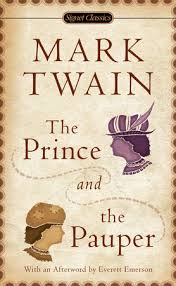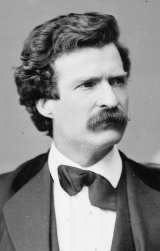The Prince and the Pauper Page #3
The Prince and the Pauper is a novel by American author Mark Twain. It was first published in 1881 in Canada, before its 1882 publication in the United States. The novel represents Twain's first attempt at historical fiction.
“Mind thy manners, thou young beggar!” The crowd jeered and laughed; but the young prince sprang to the gate with his face flushed, and his eyes flashing with indignation, and cried out,-- “How dar’st thou use a poor lad like that? How dar’st thou use the King my father’s meanest subject so? Open the gates, and let him in!” You should have seen that fickle crowd snatch off their hats then. You should have heard them cheer, and shout, “Long live the Prince of Wales!” The soldiers presented arms with their halberds, opened the gates, and presented again as the little Prince of Poverty passed in, in his fluttering rags, to join hands with the Prince of Limitless Plenty. Edward Tudor said-- “Thou lookest tired and hungry: thou’st been treated ill. Come with me.” Half a dozen attendants sprang forward to--I don’t know what; interfere, no doubt. But they were waved aside with a right royal gesture, and they stopped stock still where they were, like so many statues. Edward took Tom to a rich apartment in the palace, which he called his cabinet. By his command a repast was brought such as Tom had never encountered before except in books. The prince, with princely delicacy and breeding, sent away the servants, so that his humble guest might not be embarrassed by their critical presence; then he sat near by, and asked questions while Tom ate. “What is thy name, lad?” “Tom Canty, an’ it please thee, sir.” “‘Tis an odd one. Where dost live?” “In the city, please thee, sir. Offal Court, out of Pudding Lane.” “Offal Court! Truly ’tis another odd one. Hast parents?” “Parents have I, sir, and a grand-dam likewise that is but indifferently precious to me, God forgive me if it be offence to say it--also twin sisters, Nan and Bet.” “Then is thy grand-dam not over kind to thee, I take it?” “Neither to any other is she, so please your worship. She hath a wicked heart, and worketh evil all her days.” “Doth she mistreat thee?” “There be times that she stayeth her hand, being asleep or overcome with drink; but when she hath her judgment clear again, she maketh it up to me with goodly beatings.” A fierce look came into the little prince’s eyes, and he cried out-- “What! Beatings?” “Oh, indeed, yes, please you, sir.” “Beatings!--and thou so frail and little. Hark ye: before the night come, she shall hie her to the Tower. The King my father”-- “In sooth, you forget, sir, her low degree. The Tower is for the great alone.” “True, indeed. I had not thought of that. I will consider of her punishment. Is thy father kind to thee?” “Not more than Gammer Canty, sir.” “Fathers be alike, mayhap. Mine hath not a doll’s temper. He smiteth with a heavy hand, yet spareth me: he spareth me not always with his tongue, though, sooth to say. How doth thy mother use thee?” “She is good, sir, and giveth me neither sorrow nor pain of any sort. And Nan and Bet are like to her in this.” “How old be these?” “Fifteen, an’ it please you, sir.” “The Lady Elizabeth, my sister, is fourteen, and the Lady Jane Grey, my cousin, is of mine own age, and comely and gracious withal; but my sister the Lady Mary, with her gloomy mien and--Look you: do thy sisters forbid their servants to smile, lest the sin destroy their souls?” “They? Oh, dost think, sir, that they have servants?” The little prince contemplated the little pauper gravely a moment, then said-- “And prithee, why not? Who helpeth them undress at night? Who attireth them when they rise?” “None, sir. Would’st have them take off their garment, and sleep without--like the beasts?” “Their garment! Have they but one?” “Ah, good your worship, what would they do with more? Truly they have not two bodies each.” “It is a quaint and marvellous thought! Thy pardon, I had not meant to laugh. But thy good Nan and thy Bet shall have raiment and lackeys enow, and that soon, too: my cofferer shall look to it. No, thank me not; ’tis nothing. Thou speakest well; thou hast an easy grace in it. Art learned?” “I know not if I am or not, sir. The good priest that is called Father Andrew taught me, of his kindness, from his books.” “Know’st thou the Latin?” “But scantly, sir, I doubt.” “Learn it, lad: ’tis hard only at first. The Greek is harder; but neither these nor any tongues else, I think, are hard to the Lady Elizabeth and my cousin. Thou should’st hear those damsels at it! But tell me of thy Offal Court. Hast thou a pleasant life there?” “In truth, yes, so please you, sir, save when one is hungry. There be Punch-and-Judy shows, and monkeys--oh such antic creatures! and so bravely dressed!--and there be plays wherein they that play do shout and fight till all are slain, and ’tis so fine to see, and costeth but a farthing--albeit ’tis main hard to get the farthing, please your worship.” “Tell me more.” “We lads of Offal Court do strive against each other with the cudgel, like to the fashion of the ‘prentices, sometimes.” The prince’s eyes flashed. Said he-- “Marry, that would not I mislike. Tell me more.” “We strive in races, sir, to see who of us shall be fleetest.” “That would I like also. Speak on.” “In summer, sir, we wade and swim in the canals and in the river, and each doth duck his neighbour, and splatter him with water, and dive and shout and tumble and--” “‘Twould be worth my father’s kingdom but to enjoy it once! Prithee go on.” “We dance and sing about the Maypole in Cheapside; we play in the sand, each covering his neighbour up; and times we make mud pastry--oh the lovely mud, it hath not its like for delightfulness in all the world!--we do fairly wallow in the mud, sir, saving your worship’s presence.” “Oh, prithee, say no more, ’tis glorious! If that I could but clothe me in raiment like to thine, and strip my feet, and revel in the mud once, just once, with none to rebuke me or forbid, meseemeth I could forego the crown!” “And if that I could clothe me once, sweet sir, as thou art clad--just once--” “Oho, would’st like it? Then so shall it be. Doff thy rags, and don these splendours, lad! It is a brief happiness, but will be not less keen for that. We will have it while we may, and change again before any come to molest.” A few minutes later the little Prince of Wales was garlanded with Tom’s fluttering odds and ends, and the little Prince of Pauperdom was tricked out in the gaudy plumage of royalty. The two went and stood side by side before a great mirror, and lo, a miracle: there did not seem to have been any change made! They stared at each other, then at the glass, then at each other again. At last the puzzled princeling said-- “What dost thou make of this?” “Ah, good your worship, require me not to answer. It is not meet that one of my degree should utter the thing.” “Then will I utter it. Thou hast the same hair, the same eyes, the same voice and manner, the same form and stature, the same face and countenance that I bear. Fared we forth naked, there is none could say which was you, and which the Prince of Wales. And, now that I am clothed as thou wert clothed, it seemeth I should be able the more nearly to feel as thou didst when the brute soldier--Hark ye, is not this a bruise upon your hand?”
Translation
Translate and read this book in other languages:
Select another language:
- - Select -
- 简体中文 (Chinese - Simplified)
- 繁體中文 (Chinese - Traditional)
- Español (Spanish)
- Esperanto (Esperanto)
- 日本語 (Japanese)
- Português (Portuguese)
- Deutsch (German)
- العربية (Arabic)
- Français (French)
- Русский (Russian)
- ಕನ್ನಡ (Kannada)
- 한국어 (Korean)
- עברית (Hebrew)
- Gaeilge (Irish)
- Українська (Ukrainian)
- اردو (Urdu)
- Magyar (Hungarian)
- मानक हिन्दी (Hindi)
- Indonesia (Indonesian)
- Italiano (Italian)
- தமிழ் (Tamil)
- Türkçe (Turkish)
- తెలుగు (Telugu)
- ภาษาไทย (Thai)
- Tiếng Việt (Vietnamese)
- Čeština (Czech)
- Polski (Polish)
- Bahasa Indonesia (Indonesian)
- Românește (Romanian)
- Nederlands (Dutch)
- Ελληνικά (Greek)
- Latinum (Latin)
- Svenska (Swedish)
- Dansk (Danish)
- Suomi (Finnish)
- فارسی (Persian)
- ייִדיש (Yiddish)
- հայերեն (Armenian)
- Norsk (Norwegian)
- English (English)
Citation
Use the citation below to add this book to your bibliography:
Style:MLAChicagoAPA
"The Prince and the Pauper Books." Literature.com. STANDS4 LLC, 2025. Web. 5 Feb. 2025. <https://www.literature.com/book/the_prince_and_the_pauper_315>.








Discuss this The Prince and the Pauper book with the community:
Report Comment
We're doing our best to make sure our content is useful, accurate and safe.
If by any chance you spot an inappropriate comment while navigating through our website please use this form to let us know, and we'll take care of it shortly.
Attachment
You need to be logged in to favorite.
Log In